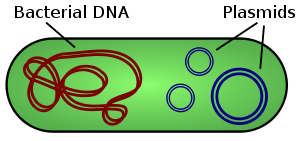
Plasmids are autonomously replicating extra-chromosomal circular DNA molecules, distinct from the normal bacterial genome and nonessential for cell survival under nonselective conditions.
They exist in an autonomous state and are transferred independently of chromosomes.
Some plasmids are capable of integrating into the host genome. A number of artificially constructed plasmids are used as cloning vectors. The gene of interest can be inserted within these artificially constructed plasmids at their multiple cloning sites(MCS).

In order to propagate, plasmids must contain an origin of replication. Naturally occurring plasmids transfer genetic information between hosts; the genes encoding resistance to a number of antibiotics are the most important clinically.
The essential components of plasmids are used by investigators to introduce genes into bacteria and yeast and to generate large amounts of DNA for manipulation.

Post a Comment